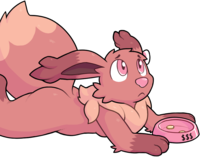For the last few weeks, glip (my partner) and I have spent a couple hours most nights playing indie games together. We started out intending to play a short list of games that had been recommended to glip, but this turns out to be a nice way to wind down, so we’ve been keeping it up and clicking on whatever looks interesting in the itch app.
Most of the games are small and made by one or two people, so they tend to be pretty tightly scoped and focus on a few particular kinds of details. I’ve found myself having brain thoughts about all that, so I thought I’d write some of them down.
I also know that some people (cough) tend not to play games they’ve never heard of, even if they want something new to play. If that’s you, feel free to play some of these, now that you’ve heard of them!
Also, I’m still figuring the format out here, so let me know if this is interesting or if you hope I never do it again!
First up:
- Lisa: The Painful
- Lisa: The Joyful
- MOOP
These are impressions, not reviews. I try to avoid major/ending spoilers, but big plot points do tend to leave impressions.
Lisa: The Painful
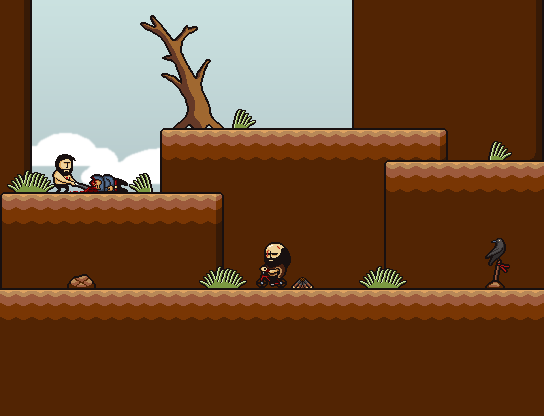
(cw: basically everything??)
Lisa: The Painful is true to its name. I hesitate to describe it as fun, exactly, but I’m glad we played it.
Everything about the game is dark. It’s a (somewhat loose) sequel to another game called Lisa, whose titular character ultimately commits suicide; her body hanging from a noose is the title screen for this game.
Ah, but don’t worry, it gets worse. This game takes place in a post-apocalyptic wasteland, where every female human — women, children, babies — is dead. You play as Brad (Lisa’s brother), who has discovered the lone exception: a baby girl he names Buddy and raises like a daughter. Now, Buddy has been kidnapped, and you have to go rescue her, presumably from being raped.
Ah, but don’t worry, it gets worse.
I’ve had a hard time putting my thoughts in order here, because so much of what stuck with me is the way the game entangles the plot with the mechanics.
I love that kind of thing, but it’s so hard to do well. I can’t really explain why, but I feel like most attempts to do it fall flat — they have a glimmer of an idea, but they don’t integrate it well enough, or they don’t run nearly as far as they could have. I often get the same feeling as, say, a hyped-up big moral choice that turns out to be picking “yes” or “no” from a menu. The idea is there, but the execution is so flimsy that it leaves no impact on me at all.
An obvious recent success here is Undertale, where the entire story is about violence and whether you choose to engage or avoid it (and whether you can do that). If you choose to eschew violence, not only does the game become more difficult, it arguably becomes a different game entirely. Granted, the contrast is lost if you (like me) tried to play as a pacifist from the very beginning. I do feel that you could go further with the idea than Undertale, but Undertale itself doesn’t feel incomplete.
Christ, I’m not even talking about the right game any more.
Okay, so: this game is a “classic” RPG, by which I mean, it was made with RPG Maker. (It’s kinda funny that RPG Maker was designed to emulate a very popular battle style, and now the only games that use that style are… made with RPG Maker.) The main loop, on the surface, is standard RPG fare: you walk around various places, talk to people, solve puzzles, recruit party members, and get into turn-based fights.
Now, Brad is addicted to a drug called Joy. He will regularly go into withdrawal, which manifests in the game as a status effect that cuts his stats (even his max HP!) dramatically.
It is really, really, incredibly inconvenient. And therein lies the genius here. The game could have simply told me that Brad is an addict, and I don’t think I would’ve cared too much. An addiction to a fantasy drug in a wasteland doesn’t mean anything to me, especially about this tiny sprite man I just met, so I would’ve filed this away as a sterile fact and forgotten about it. By making his addiction affect me, I’m now invested in it. I wish Brad weren’t addicted, even if only because it’s annoying. I found a party member once who turned out to have the same addiction, and I felt dread just from seeing the icon for the status effect. I’ve been looped into the events of this story through the medium I use to interact with it: the game.
It’s a really good use of games as a medium. Even before I’m invested in the characters, I’m invested in what’s happening to them, because it impacts the game!
Incidentally, you can get Joy as an item, which will temporarily cure your withdrawal… but you mostly find it by looting the corpses of grotesque mutant flesh horrors you encounter. I don’t think the game would have the player abruptly mutate out of nowhere, but I wasn’t about to find out, either. We never took any.
Virtually every staple of the RPG genre has been played with in some way to tie it into the theme/setting. I love it, and I think it works so well precisely because it plays with expectations of how RPGs usually work.
Most obviously, the game is a sidescroller, not top-down. You can’t jump freely, but you can hop onto one-tile-high boxes and climb ropes. You can also drop off off ledges… but your entire party will take fall damage, which gets rapidly more severe the further you fall.
This wouldn’t be too much of a problem, except that healing is hard to come by for most of the game. Several hub areas have campfires you can sleep next to to restore all your health and MP, but when you wake up, something will have happened to you. Maybe just a weird cutscene, or maybe one of your party members has decided to leave permanently.
Okay, so use healing items instead? Good luck; money is also hard to come by, and honestly so are shops, and many of the healing items are woefully underpowered.
Grind for money? Good luck there, too! While the game has plenty of battles, virtually every enemy is a unique overworld human who only appears once, and then is dead, because you killed him. Only a handful of places have unlimited random encounters, and grinding is not especially pleasant.
The “best” way to get a reliable heal is to savescum — save the game, sleep by the campfire, and reload if you don’t like what you wake up to.
In a similar vein, there’s a part of the game where you’re forced to play Russian Roulette. You choose a party member; he and an opponent will take turns shooting themselves in the head until someone finds a loaded chamber. If your party member loses, he is dead. And you have to keep playing until you win three times, so there’s no upper limit on how many people you might lose. I couldn’t find any way to influence who won, so I just had to savescum for a good half hour until I made it through with minimal losses.
It was maddening, but also a really good idea. Games don’t often incorporate the existence of saves into the gameplay, and when they do, they usually break the fourth wall and get all meta about it. Saves are never acknowledged in-universe here (aside from the existence of save points), but surely these parts of the game were designed knowing that the best way through them is by reloading. It’s rarely done, it can easily feel unfair, and it drove me up the wall — but it was certainly painful, as intended, and I kinda love that.
(Naturally, I’m told there’s a hard mode, where you can only use each save point once.)
The game also drives home the finality of death much better than most. It’s not hard to overlook the death of a redshirt, a character with a bit part who simply doesn’t appear any more. This game permanently kills your party members. Russian Roulette isn’t even the only way you can lose them! Multiple cutscenes force you to choose between losing a life or some other drastic consequence. (Even better, you can try to fight the person forcing this choice on you, and he will decimate you.) As the game progresses, you start to encounter enemies who can simply one-shot murder your party members.
It’s such a great angle. Just like with Brad’s withdrawal, you don’t want to avoid their deaths because it’d be emotional — there are dozens of party members you can recruit (though we only found a fraction of them), and most of them you only know a paragraph about — but because it would inconvenience you personally. Chances are, you have your strongest dudes in your party at any given time, so losing one of them sucks. And with few random encounters, you can’t just grind someone else up to an appropriate level; it feels like there’s a finite amount of XP in the game, and if someone high-level dies, you’ve lost all the XP that went into them.
The battles themselves are fairly straightforward. You can attack normally or use a special move that costs MP. SP? Some kind of points.
Two things in particular stand out. One I mentioned above: the vast majority of the encounters are one-time affairs against distinct named NPCs, who you then never see again, because they are dead, because you killed them.
The other is the somewhat unusual set of status effects. The staples like poison and sleep are here, but don’t show up all that often; more frequent are statuses like weird, drunk, stink, or cool. If you do take Joy (which also cures depression), you become joyed for a short time.
The game plays with these in a few neat ways, besides just Brad’s withdrawal. Some party members have a status like stink or cool permanently. Some battles are against people who don’t want to fight at all — and so they’ll spend most of the battle crying, purely for flavor impact. Seeing that for the first time hit me pretty hard; until then we’d only seen crying as a mechanical side effect of having sand kicked in one’s face.
The game does drag on a bit. I think we poured 10 in-game hours into it, which doesn’t count time spent reloading. It doesn’t help that you walk not super fast.
My biggest problem was with getting my bearings; I’m sure we spent a lot of that time wandering around accomplishing nothing. Most of the world is focused around one of a few hub areas, and once you’ve completed one hub, you can move onto the next one. That’s fine. Trouble is, you can go any of a dozen different directions from each hub, and most of those directions will lead you to very similar-looking hills built out of the same tiny handful of tiles. The connections between places are mostly cave entrances, which also largely look the same. Combine that with needing to backtrack for puzzle or progression reasons, and it’s incredibly difficult to keep track of where you’ve been, what you’ve done, and where you need to go next.
I don’t know that the game is wrong here; the aesthetic and world layout are fantastic at conveying a desolate wasteland. I wouldn’t even be surprised if the navigation were deliberately designed this way. (On the other hand, assuming every annoyance in a despair-ridden game is deliberate might be giving it too much credit.) But damn it’s still frustrating.
I felt a little lost in the battle system, too. Towards the end of the game, Brad in particular had over a dozen skills he could use, but I still couldn’t confidently tell you which were the strongest. New skills sometimes appear in the middle of the list or cost less than previous skills, and the game doesn’t outright tell you how much damage any of them do. I know this is the “classic RPG” style, and I don’t think it was hugely inconvenient, but it feels weird to barely know how my own skills work. I think this puts me off getting into new RPGs, just generally; there’s a whole new set of things I have to learn about, and games in this style often won’t just tell me anything, so there’s this whole separate meta-puzzle to figure out before I can play the actual game effectively.
Also, the sound could use a little bit of… mastering? Some music and sound effects are significantly louder and screechier than others. Painful, you could say.
The world is full of side characters with their own stuff going on, which is also something I love seeing in games; too often, the whole world feels like an obstacle course specifically designed for you.
Also, many of those characters are, well, not great people. Really, most of the game is kinda fucked up. Consider: the weird status effect is most commonly inflicted by the “Grope” skill. It makes you feel weird, you see. Oh, and the currency is porn magazines.
And then there are the gangs, the various spins on sex clubs, the forceful drug kingpins, and the overall violence that permeates everything (you stumble upon an alarming number of corpses). The game neither condones nor condemns any of this; it simply offers some ideas of how people might behave at the end of the world. It’s certainly the grittiest interpretation I’ve seen.
I don’t usually like post-apocalypses, because they try to have these very hopeful stories, but then at the end the world is still a blighted hellscape so what was the point of any of that? I like this game much better for being a blighted hellscape throughout. The story is worth following to see where it goes, not just because you expect everything wrapped up neatly at the end.
…I realize I’ve made this game sound monumentally depressing throughout, but it manages to pack in a lot of funny moments as well, from the subtle to the overt. In retrospect, it’s actually really good at balancing the mood so it doesn’t get too depressing. If nothing else, it’s hilarious to watch this gruff, solemn, battle-scarred, middle-aged man pedal around on a kid’s bike he found.
An obvious theme of the game is despair, but the more I think about it, the more I wonder if ambiguity is a theme as well. It certainly fits the confusing geography.
Even the premise is a little ambiguous. Is/was Olathe a city, a country, a whole planet? Did the apocalypse affect only Olathe, or the whole world? Does it matter in an RPG, where the only world that exists is the one mapped out within the game?
Towards the end of the game, you catch up with Buddy, but she rejects you, apparently resentful that you kept her hidden away for her entire life. Brad presses on anyway, insisting on protecting her.
At that point I wasn’t sure I was still on Brad’s side. But he’s not wrong, either. Is he? Maybe it depends on how old Buddy is — but the game never tells us. Her sprite is a bit smaller than the men’s, but it’s hard to gauge much from small exaggerated sprites, and she might just be shorter. In the beginning of the game, she was doing kid-like drawings, but we don’t know how much time passed after that. Everyone seems to take for granted that she’s capable of bearing children, and she talks like an adult. So is she old enough to be making this decision, or young enough for parent figure Brad to overrule her? What is the appropriate age of agency, anyway, when you’re the last girl/woman left more than a decade after the end of the world?
Can you repopulate a species with only one woman, anyway?
Well, that went on a bit longer than I intended. This game has a lot of small touches that stood out to me, and they all wove together very well.
Should you play it? I have absolutely no idea.
FINAL SCORE: 1 out of 6 chambers
Lisa: The Joyful
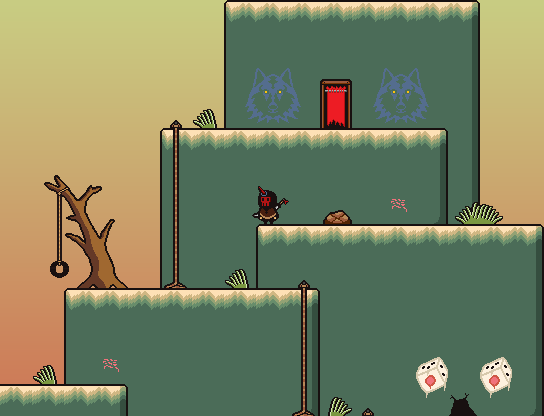
Surprise! There’s a third game to round out this trilogy.
Lisa: The Joyful is much shorter, maybe three hours long — enough to be played in a night rather than over the better part of a week.
This one picks up immediately after the end of Painful, with you now playing as Buddy. It takes a drastic turn early on: Buddy decides that, rather than hide from the world, she must conquer it. She sets out to murder all the big bosses and become queen.
The battle system has been inherited from the previous game, but battles are much more straightforward this time around. You can’t recruit any party members; for much of the game, it’s just you and a sword.
There is a catch! Of course.
The catch is that you do not have enough health to survive most boss battles without healing. With no party members, you cannot heal via skills. I don’t think you could buy healing items anywhere, either. You have a few when the game begins, but once you run out, that’s it.
Except… you also have… some Joy. Which restores you to full health and also makes you crit with every hit. And drops off of several enemies.
We didn’t even recognize Joy as a healing item at first, since we never used it in Painful; it’s description simply says that it makes you feel nothing, and we’d assumed the whole point of it was to stave off withdrawal, which Buddy doesn’t experience. Luckily, the game provided a hint in the form of an NPC who offers to switch on easy mode:
What’s that? Bad guys too tough? Not enough jerky? You don’t want to take Joy!? Say no more, you’ve come to the right place!
So the game is aware that it’s unfairly difficult, and it’s deliberately forcing you to take Joy, and it is in fact entirely constructed around this concept. I guess the title is a pretty good hint, too.
I don’t feel quite as strongly about Joyful as I do about Painful. (Admittedly, I was really tired and starting to doze off towards the end of Joyful.) Once you get that the gimmick is to force you to use Joy, the game basically reduces to a moderate-difficulty boss rush. Other than that, the only thing that stood out to me mechanically was that Buddy learns a skill where she lifts her shirt to inflict flustered as a status effect — kind of a lingering echo of how outrageous the previous game could be.
You do get a healthy serving of plot, which is nice and ties a few things together. I wouldn’t say it exactly wraps up the story, but it doesn’t feel like it’s missing anything either; it’s exactly as murky as you’d expect.
I think it’s worth playing Joyful if you’ve played Painful. It just didn’t have the same impact on me. It probably doesn’t help that I don’t like Buddy as a person. She seems cold, violent, and cruel. Appropriate for the world and a product of her environment, I suppose.
FINAL SCORE: 300 Mags
MOOP
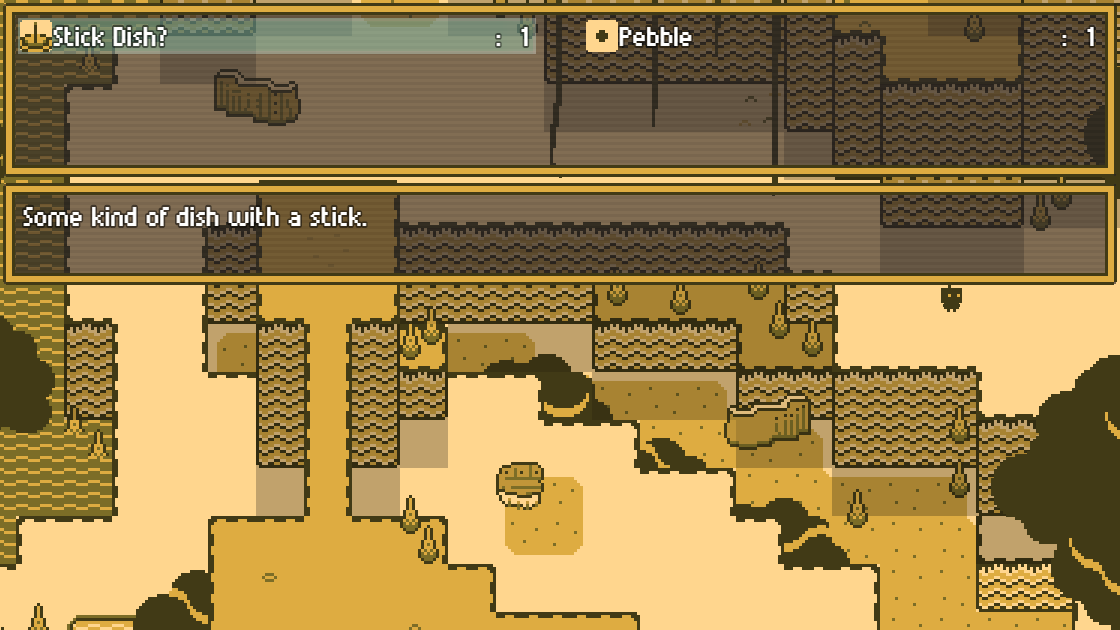
Finally, as something of a palate cleanser, we have MOOP: a delightful and charming little inventory game.
I don’t think “inventory game” is a real genre, but I mean the kind of game where you go around collecting items and using them in the right place. Puzzle-driven, but with “puzzles” that can largely be solved by simply trying everything everywhere. I’d put a lot of point and click adventures in the same category, despite having a radically different interface. Is that fair? Yes, because it’s my blog.
MOOP was almost certainly also made in RPG Maker, but it breaks the mold in a very different way by not being an RPG. There are no battles whatsoever, only interactions on the overworld; you progress solely via dialogue and puzzle-solving. Examining something gives you a short menu of verbs — use, talk, get — reminiscent of interactive fiction, or perhaps the graphical “adventure” games that took inspiration from interactive fiction. (God, “adventure game” is the worst phrase. Every game is an adventure! It doesn’t mean anything!)
Everything about the game is extremely chill. I love the monochrome aesthetic combined with a large screen resolution; it feels like I’m peeking into an alternate universe where the Game Boy got bigger but never gained color. I played halfway through the game before realizing that the protagonist (Moop) doesn’t have a walk animation; they simply slide around. Somehow, it works.
The puzzles are a little clever, yet low-pressure; the world is small enough that you can examine everything again if you get stuck, and there’s no way to lose or be set back. The music is lovely, too. It just feels good to wander around in a world that manages to make sepia look very pretty.
The story manages to pack a lot into a very short time. It’s… gosh, I don’t know. It has a very distinct texture to it that I’m not sure I’ve seen before. The plot weaves through several major events that each have very different moods, and it moves very quickly — but it’s well-written and doesn’t feel rushed or disjoint. It’s lighthearted, but takes itself seriously enough for me to get invested. It’s fucking witchcraft.
I think there was even a non-binary character! Just kinda nonchalantly in there. Awesome.
What a happy, charming game. Play if you would like to be happy and charmed.
FINAL SCORE: 1 waxing moon
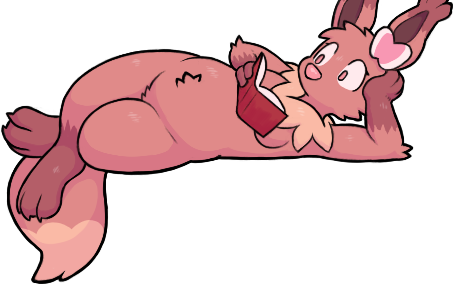
![[articles]](https://eev.ee/theme/images/category-articles.png)
